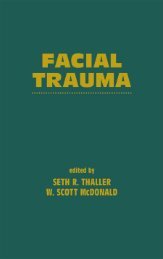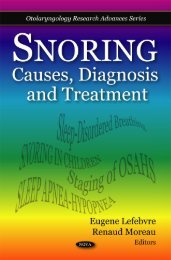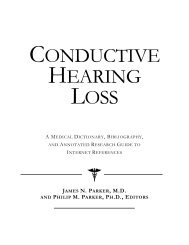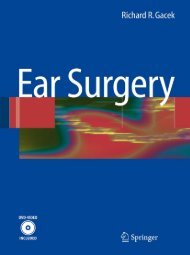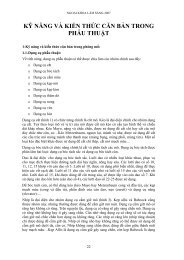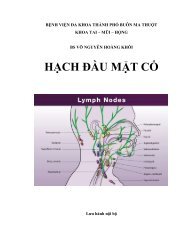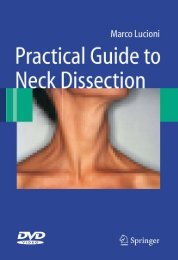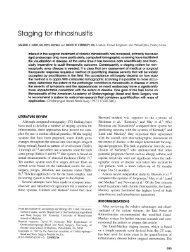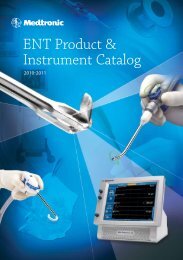Familial Nasopharyngeal Carcinoma 6
Familial Nasopharyngeal Carcinoma 6
Familial Nasopharyngeal Carcinoma 6
- No tags were found...
Create successful ePaper yourself
Turn your PDF publications into a flip-book with our unique Google optimized e-Paper software.
280 S. S. Lo, J. J. Lu, and L. KongEustachian tubes by tumor. Sensorineural hearingloss may be induced by cisplatin-based chemotherapy,which is commonly used as a radiosensitizer.The reported incidence of hearing deficits afterradiotherapy for NPC is variable. In a large seriesfrom Hong Kong, the rate of hearing deficit was 19.2%and patients who received accelerated fractionatedradiotherapy had a higher rate of hearing deficit (Leeet al. 2009). Other series reported rates of hearing lossexceeding 50% (Yeh et al. 2005; Chan et al. 2009;Chen et al. 2006). The sensorineural hearing loss istypically in the high frequency range and is related tothe mean radiation dose exposure to the cochlea andthe concurrent cisplatin dose (Chan et al. 2009).22.3.1PathogenesisRadiation can cause late toxicities in the external earincluding skin atrophy, skin ulceration, external canalstenosis, and external otitis (Jereczek-Fossa et al.2003). Decreased wax secretion can occur as a resultof epithelial damage and destruction of sebaceousand apocrine glands. Those changes can potentiallylead to some degree of conductive hearing deficit(Jereczek-Fossa et al. 2003).During head and neck radiation therapy, especiallyin patients with NPC, the components of the middleear including the ossicles, the Eustachian tubes, andthe middle ear cavity frequently receive a significantradiation dose, sometimes close to tumor dose, especiallywhen conventional radiotherapy techniques areused. Otitis media can occur as a result of tumefactionof the mucosa and blockage within the cartilaginouspart or at the pharyngeal orifice of the Eustachiantubes (Jereczek-Fossa et al. 2003). Gas resorptionby the middle ear mucosa coupled with compromisedmechanism of pressure equilibration duringswallowing or yawning can result in reduction ofpressure in the middle ear cavity, retraction of thetympanic membrane, and increased tension in theossicles leading to impairment of sound conduction.If this condition persists, transudation of fluid fromengorged capillaries will lead to chronic effusioninside the middle ear cavity (Jereczek-Fossa et al.2003). This will cause metaplasia of the normalepithelium into mucus-secreting pseudostratified,columnar, ciliated epithelium. A tenacious depositwill then accumulate and this may cause formationof fibrovascular granulation tissue or inflammatorypolyps, which will lead to tympanic drum performation.If atrophic otitis or necrosis of the ossicles occur,the conductive hearing loss will become permanent(Jereczek-Fossa et al. 2003).Sensorineural hearing loss typically occurs severalmonths after completion of radiotherapy and is usuallychronic, progressive, and irreversible. Radiationinducedvascular insufficiency has been implicated inthe mechanism of sensorineural hearing loss(Jereczek-Fossa et al. 2003). The process can lead toprogressive degeneration and atrophy of the inner earsensory structures, fibrosis, and possibly ossificationof the inner ear fluid spaces. Histologic examination ofirradiated temporal bone showed hemorrhage in innerear spaces and edema of membranous labyrinth, lossof cells in the organ of Corti, atrophy of stria vascularis,atrophy of spiral ganglion cells and cochlearnerve, reduced number of capillaries, and degenerationof endothelium in vessels (Chan et al. 2009;Jereczek-Fossa et al. 2003; Gamble et al. 1968).22.3.2Clinical Manifestation and DiagnosisOtologic deficits caused by both tumor and radiationeffects are common in patients with NPC. A significantproportion of patients may present with someconductive hearing loss as a result of otitis mediawith effusion. Otologic evaluation is usually promptedby persistent or new onset of progressive hearingloss. In patients with serous otitis media caused byradiotherapy, they usually start to have some conductivehearing loss during treatment and the deficitdoes not improve. Cisplatin-induced sensorineuralhearing loss usually occurs acutely, with effectsapparent within a few days after drug administration(Chen et al. 2006). The deficit is more severe in higherfrequency range and is proportional to the cumulativecisplatin dose. On the contrary, in patients withradiation-induced sensorineural hearing loss, thereis usually a latent period of 6–12 months. Similar tocisplatin-induced sensorineural hearing loss, thedeficit is also more severe in higher frequency range.Such patterns of hearing deficit will manifest as difficultyin hearing in a noisy environment andincreased susceptibility to masking by low-frequencybackground noise (Chan et al. 2009).A complete baseline otologic evaluation includingmicroscopic otoscopy and functional tests such aspure tone audiometry, tympanometry, and stapedialreflexes is necessary to evaluate patients with otologiccomplications caused by radiation therapy or prior to



